Welp, time for terror. Twelve’s betrayed Nine in order to save Lisa, Shibazaki’s learned the truth, and Five is as ridiculous and show-warping as ever. Let’s see what happens next!
Episode 10
2:17 – Hah! Great way to start an episode. “I wanted to get caught” is currently the most overused trick in the thriller book, but hey, no-one’s ever accused Zankyou’s overt narrative of originality
3:00 – And yep, the classic interrogation scene and everything. Well-chosen hair once again making for great framing. I’ve heard that anime’s usual wild hair choices are often intended to make their characters stand out, but Zankyou manages to make fairly human-looking hair (well, outside of Five) do a whole lot of visual heavy lifting
3:13 – Nice shot
3:22 – Hell, even the absence of hair makes for a dynamic choice
4:04 – And there goes any lingering chance of Shibazaki and Lisa being related. He has a normal family, he’s just distant from them, I guess
4:16 – A very loaded line in this show. Yeah, kids grow up so fast – but in this show, kids become adults the moment they do something unforgivable
5:33 – A funny concept. Sphinx have been “building trust” with all their various smaller acts of terrorism, and are now asking to be allowed a turn to speak in light of that trust. It’s hard to be heard!
6:34 – Another nice shot. Things aren’t looking great for ol’ Shibazaki. His choices directly echo the chief’s “I will take complete responsibility” from the last scene – he’s sent his partner away to take the blow himself
6:53 – This time, it’s a western-style house
7:30 – Nice animation of her movements here. Well-chosen moment
8:00 – Alright, I guess we’re going there. Japanese nationalism, regaining a sense of “pride” and power. Couldn’t be more relevant, considering the current ascendance of right-wing rhetoric. It’s a very Japanese issue, but also one we’re seeing across Europe, too. We live in an age of mistrust
8:07 – Friggin’ nationalism is the same all over. Japan’s obviously in a very specific quagmire when it comes to this “national identity” stuff, but I’m perfectly familiar with this kind of tough-guy groupthink posturing in the States, too
8:54 – A very apt way to put it. Tying back in with Oedipus, as well as the general “childhood rebellion” theme. This show can be pretty graceful when it wants to!
9:13 – And here’s the USA’s own motive, making sure they maintain control. Japan is essentially the “unruly child” in a larger-scale conflict, with the Japanese nationalists attempting to demonstrate their voice in the same way Sphinx have been forced to. There are no equal power dynamics here
9:32 – A key line. This episode’s really pulling things together
9:37 – This might as well be the show’s thesis. And this is its hope. “If anyone says there’s no reason to hope…”
11:42 – Aww. They’re classic beats, but I like these guys. Their friendship works for me
12:33 – Another perfect line. Echoing Five’s “do you think those boys have a future?”
12:53 – Yep. And yet both they and Nine have similar desires – Nine wants to expose the injustice of how Japan has been treating its children, which will in turn prove to the American government that they have been too lax with Japan
13:12 – Yeah I can imagine that they wouldn’t have been terribly happy about that one
14:59 – The motorcycle’s been a symbol of freedom, but family ties you down. Gives you responsibilities. Even if you try to run away from the world
18:11 – Had to happen eventually. Five can only turn this show into her own personal Hollywood movie so many times
19:09 – How it often works. We make enemies of each other, because we can actually see each other. Those pushing us down are distant faces
20:16 – Sad line. Like in the last episode, these kids can only express feelings for each other through the violence they’ve internalized
21:25 – And his bomb floats into the air, like a white feather
And Done
Oh man! I really loved that episode – I’d always assumed the “kids abducted by a secret organization” part of the narrative would just provide a convenient way to establish these kids as products of their society, but actually tying the creation of that organization to existing issues of Japanese nationalism pulls the whole damn show together. It makes the interference of the United States significantly more graceful and purposeful, and lends the entire show more poignance and relevance. Fantastic choice!
I also actually enjoyed a scene with Five for perhaps the first time in this entire show – she’s always been more ridiculous than the show’s other elements, but her exit was a legitimately affecting moment. I obviously don’t think her overall influence on the show has been a positive one, but at least she left it with style.
And now the bomb’s set! Tokyo’s gonna explode! Everybody’s gonna die! That’s what happens when you try to silence people – they end up doing something drastic. I’m very excited to see how everything ends.

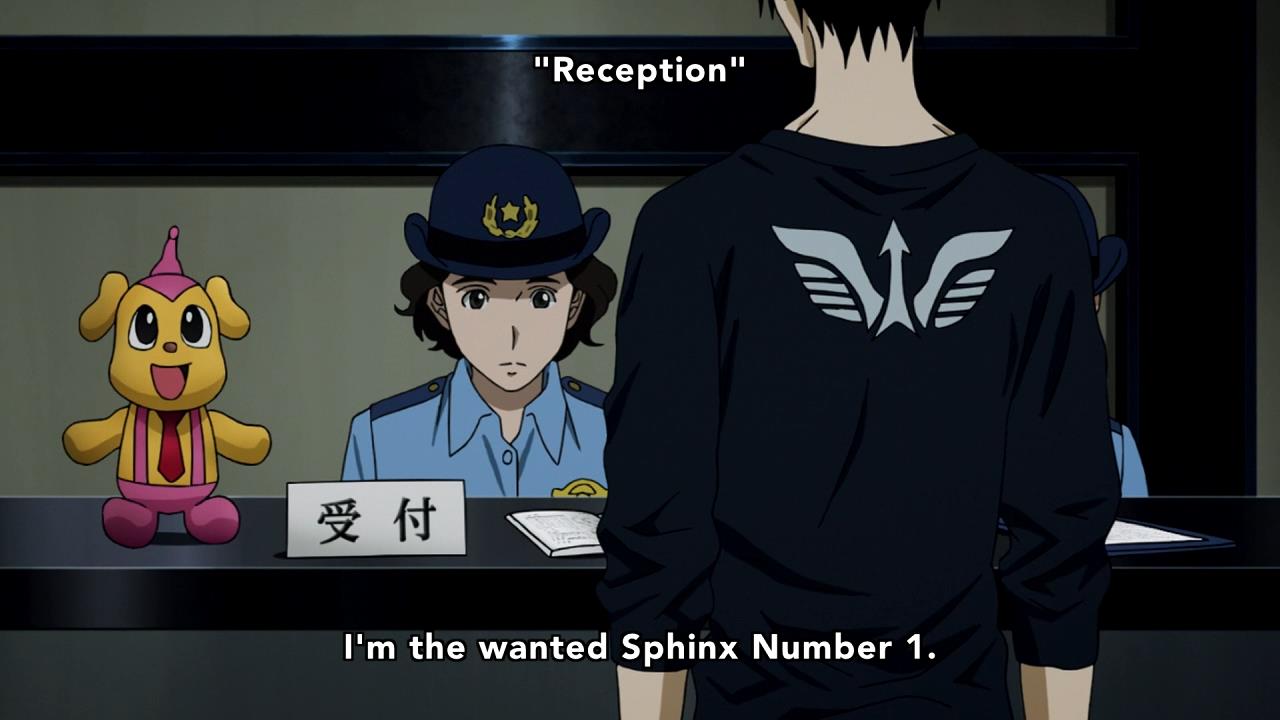
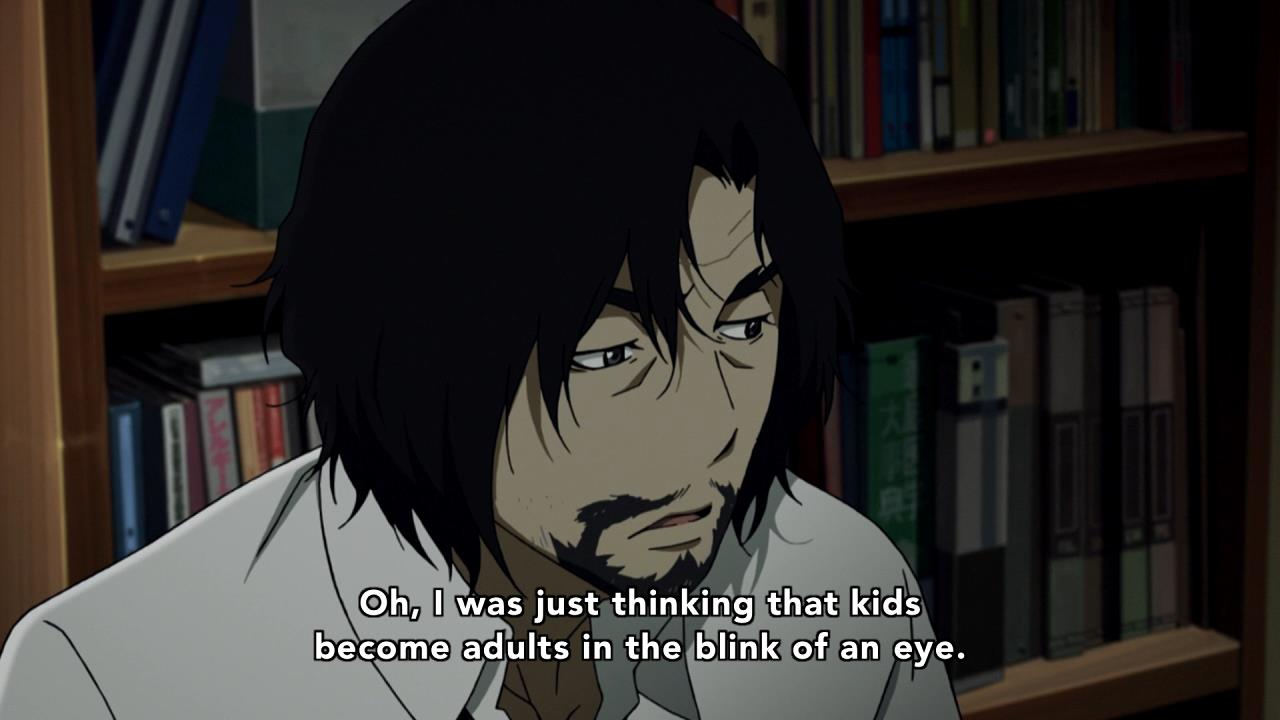
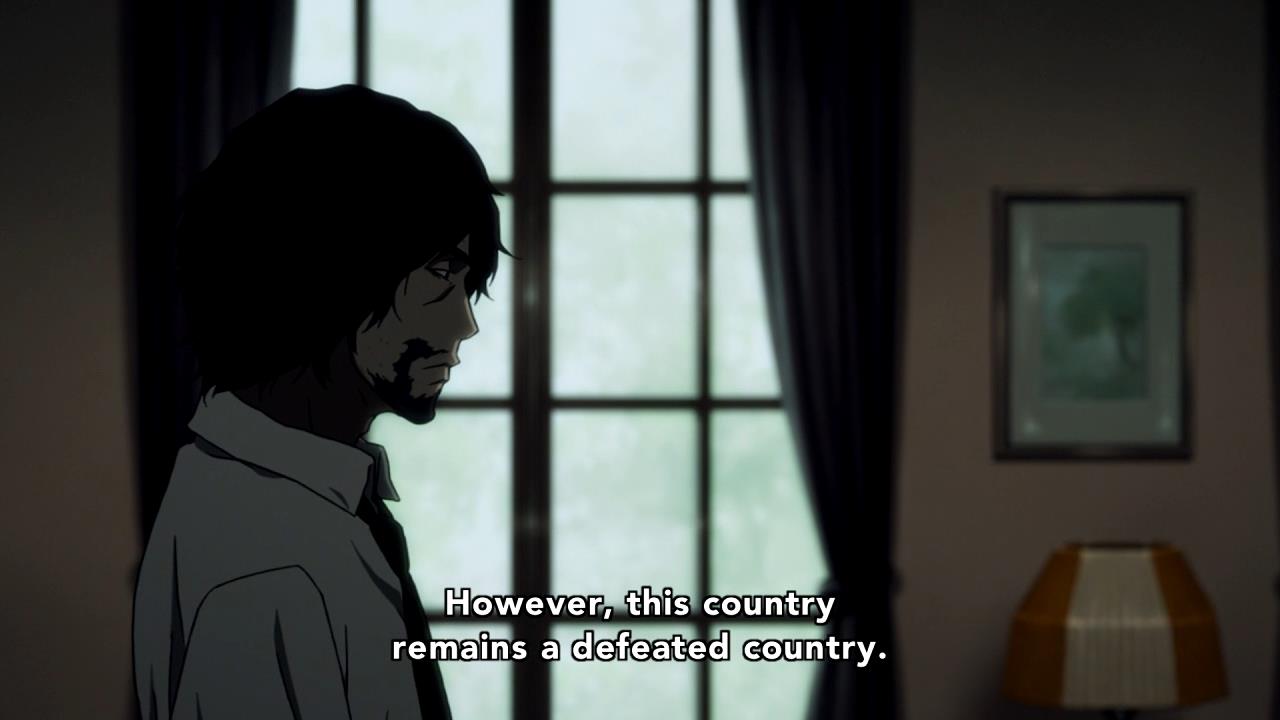
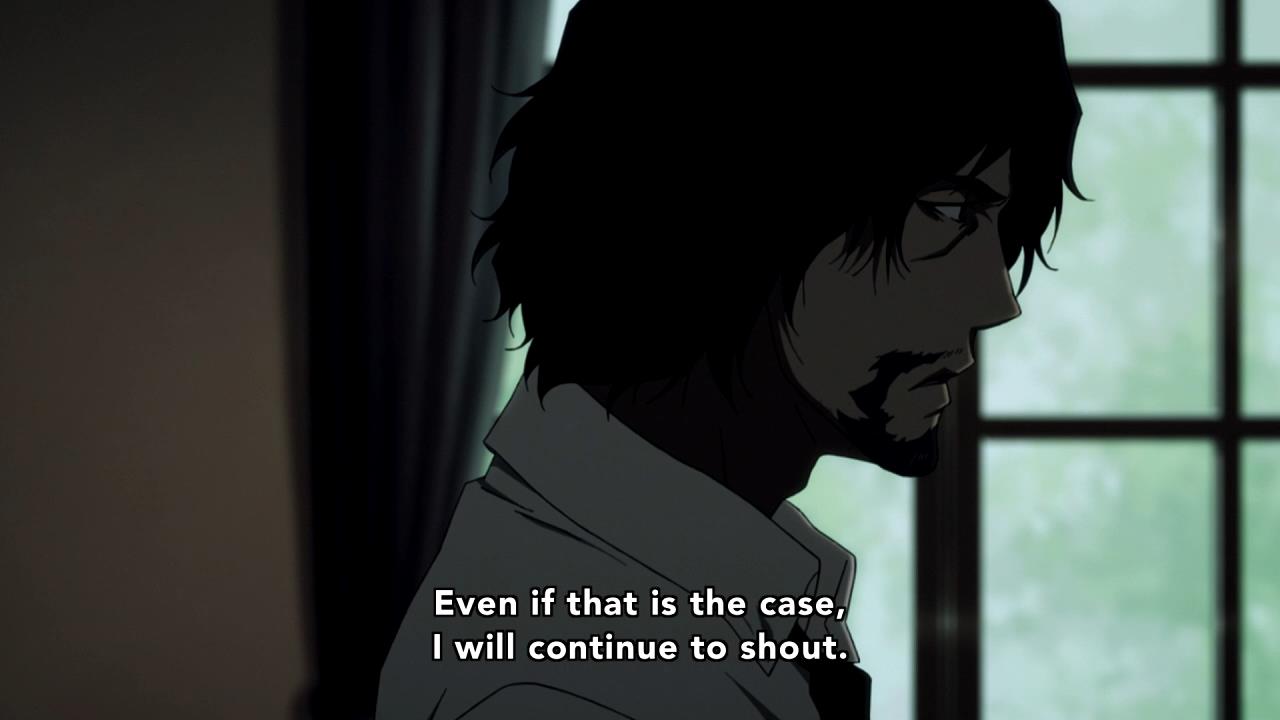
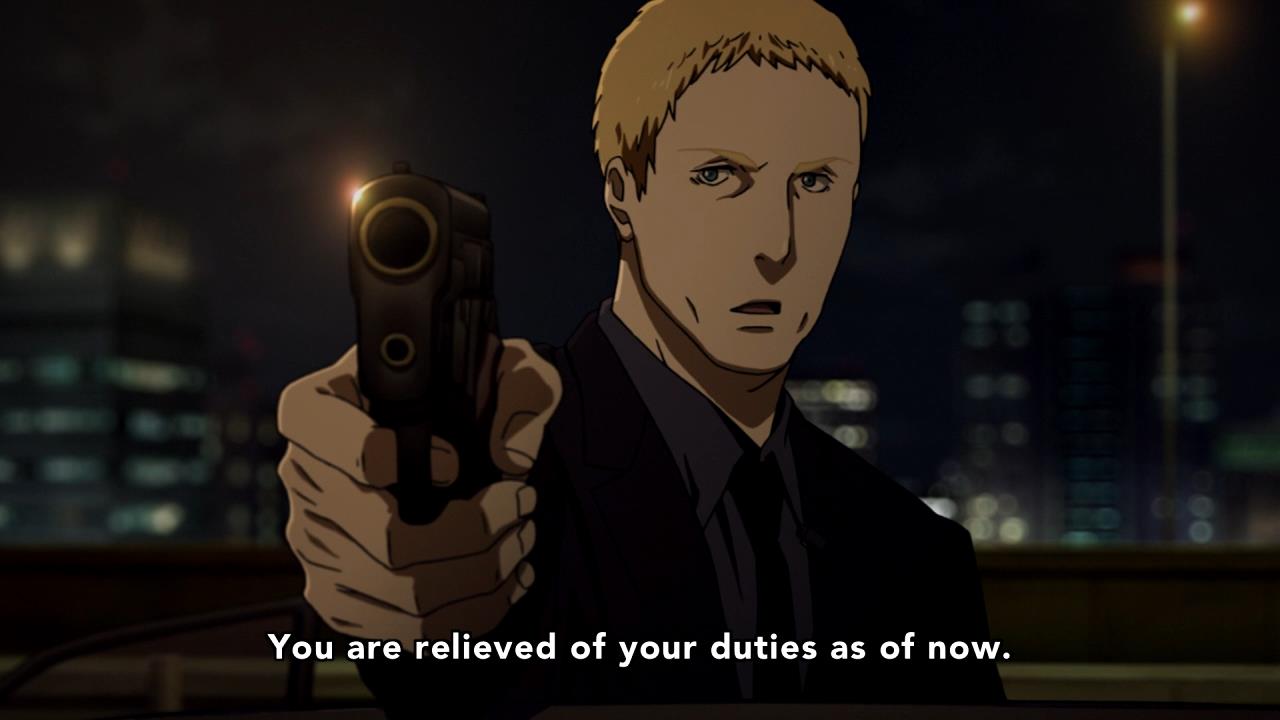
The show seems to be trying to walk a balance between telling these big controversial issues and being… oddly sanitized. Nobody has died during the terrorist strikes yet the two protagonists aren’t monsters but are genuinely good people. I’m trying to figure out that whether leaving out the realities of terrorism is an acceptable way to explore the causes of this or whether it’s an… unacceptable lie and simplification. After all we use fiction to explore taboo subjects and sometimes we can use the improbabilities that are allowed in fiction to make them safer.
What the show is saying seems to be ultimately true, but also the real issue is incredibly more ugly and complex then that.
And Nationalism… Kind of want more of an exploration of that. It’s something I find horrifying and a bit outdated. Kind of wonder how a failed experiment that just resulted in a lot of dead children could’ve possibly done anything for Japan, other then add another black mark on it’s history.
The only difference between a terrorist and a freedom fighter is who writes the history. That’s the reality of terrorism. In the 1980s the late Nelson Mandela was called a terrorist, not just by the apartheid-era South African government but also by the British government led by Margaret Thatcher.
The same British government made it law that the voices of Sinn Fein leaders Gerry Adams and Martin McGuinness could not be broadcast on British TV and Radio, but had to be dubbed by actors (so those words may not be their own). Now they’re respected politicians, have tea at Buckingham Palace, that kind of thing. Used to be called terrorists, now they’re not.
Osama Bin Laden was once the darling of the CIA, and the Taliban were beloved plucky freedom fighters opposing the evil Soviet occupation of Afghanistan.
It’s a complicated subject and as Shibazaki says, one time they’d have called Sphinx something else. If they expose the Athena Plan then they’re heroes, not terrorists.
Yeah, that’s true. It would have been a meaningful twist to have someone die, especially in the subway bomb. And also, it would have been nice to have the show explain the consequences for the victims. After all, the psychological damage the victims might have took is enough to not consider Nine’s and twelve’s cause rightgeous in any way. The shows fails to mention that. Let’s just hope there are no copycats that are so naive to think Twelve and Nine’s way of dealing with issues is legitimate.
Well having someone die may hurt the narrative a bit (the whole adults and children thing, acceptable versus unacceptable). It’s more of a problem with the fundamental conceit. I’m not sure I can consider Nine and Twelve terrorists, if they are they’re pretty awful at it. Terrorism’s goal is to sow fear, you sow fear by killing people.
Nine and Twelve aren’t exactly feared, you don’t see people panicking or being afraid to go outside. People think they’re cool. Which I think is actually… probable. Lots of property has been destroyed, but nobody has died. They’ve haven’t shown themselves to be a real danger… yet.
As Antony said, it’s generally just a matter of perspective. It’d be difficult to make the characters sympathetic from an audience perspective if they were completely willing to kill, but that people who fundamentally consider themselves just can be driven to kill by circumstance isn’t really controversial. And making it 100% about the nature of terrorism would kind of go against its general ideas about youth and society.
I felt that the role of Five was completely destroyed in this episode, her death comes out of fucking nowhere, with no real explanation why, no sense of build up or drama. It just happened because it had to, I guess.
Also, can someone explain to me why 9 turns himself to the cops, so that later he would get away?
He didn’t actually want to get away – it was only because Five independently attacked the convoy that he ended up doing so. He wanted to actually hold the press conference, and publicly reveal the nature of the program he escaped from. His motivation all along has been to gain the influence necessary to bring about a public condemnation of the program that wronged him.
Sometimes I feel as though Zankyou lacks confidence in its audience, what with the riddles, Five, and the airport sequence. It seems to be playing to the Death Note/Code Geass audience, but it lacks the melodrama and convoluted plot lines that I think people (such as myself to an extent) like about those kinds of shows. Ultimately, it has smarter messages and concepts to convey, which it does very well. It’s just that when it comes to the overt plot it reminds me of the tale of the gourmet chef failing to recreate fast food without the recipe. But yeah, this episode what pretty great. I’m really looking forward to the ending, too.
I enjoyed Five being called out on her bullshit this episode. It would have been nice to have seen more of her relationship with Nine at the institute, but she exited the show gracefully.
Yeah, Five needed another scene or two with Nine for their relationship to really ring true. If only we’d gotten that instead of a little of the airport nonsense…
I wonder if the show’s actually gonna end with the bomb exploding and the city being annihilated. That would be… something.
I’m not sure I fully understand Five’s motivations. All of that, toying with Nine and Twelve, blowing up buildings, playing the chess game with them, and she just wanted to kiss Nine in the end?
Also, it’s interesting how the theme of nationalism comes up (a very relevant issue in Japan). Has this theme popped up in any of Shinichiro Watanabe’s other works?
Looking forward to the next episode.
Since the bomb is rising into the atmosphere, it is more likely going to be an EMP explosion. Nuclear detonations in the upper atmosphere create massive EMP shock waves which wreck havoc on electronics over an extremely large radius. The idea behind this is not to attack the people directly, but to attack the system. Of course there will be deaths, as well as rioting and looting as a result of an extremely widespread blackout, and I’m sure Nine and Twelve are aware of this. Even if it’s less bloody than wiping out the city, it’s still going to put a lot of blood on their hands, which is something they wished to avoid if they could.
It was an adaptation and not his original story, but Kids on the Slope did at least gesture towards ideas of youth rebellion and national identity. I don’t remember anything relevant from his other works, though.
Pingback: Summer 2014 – Week 12 in Review | Wrong Every Time